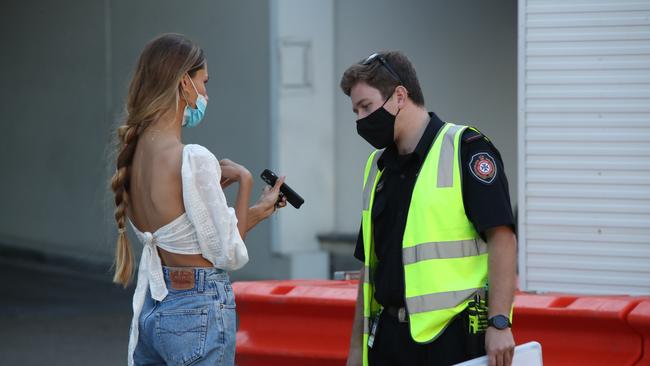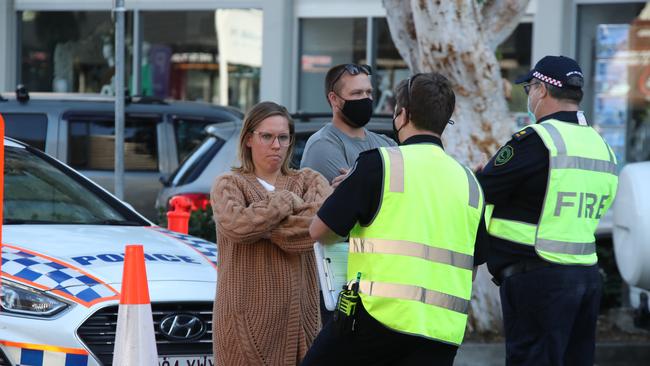‘Vax passports’: Jab proof may soon be needed for everyday life
A state government-issued edict could be the start of a new way of life where proof of vaccination is needed not only for travel, but also to go to a restaurant, concert or football match, experts say. Would you support it? Have your say in our poll.
QLD Coronavirus News
Don't miss out on the headlines from QLD Coronavirus News. Followed categories will be added to My News.
A vaccine “passport” is a step closer for Queenslanders after the Palaszczuk government dramatically mandated precedent-setting Covid jabs for workers crossing the border.
Premier Annastacia Palaszczuk issued the edict on Monday, saying that all essential workers wanting to cross the border from Friday will have to have had at least one coronavirus shot.
Experts say the move could be the start of a new way of life where people will need proof of vaccination for travel and other everyday events, such as going to a restaurant, concert or football match.
It is set to cause more bedlam at the border, after mass chaos and confusion since all of NSW was plunged into a snap seven-day lockdown on Saturday.
Hundreds of people, including an aged-care worker and a disability carer were turned away at the Gold Coast border checkpoints on Monday as police stopped every vehicle and pedestrian trying to cross the state line.

The Covid crisis for the nation deepened on Monday, with NSW recording 478 new cases, Victoria announcing a two-week extension of its lockdown and the Northern Territory enforcing strict stay-at-home orders after one positive case.
The tough new jab requirement in a bid to keep the virus out comes after Western Australia announced that anyone travelling from NSW would have to provide evidence of at least one dose of the vaccine.
Associate Professor Paul Griffin, an infectious diseases expert and microbiologist at the University of Queensland, said it could be the first step towards Queenslanders needing vaccination proof for everyday living.
“We’re starting to recognise the genuine protection provided by the vaccine,” Professor Griffin said.
“This is not about punishing people that aren’t vaccinated – it’s about recognising the reduced risk of people who are and rewarding them by returning some of the freedoms they’ve lost.
“There’s no perfect solution or silver bullet, but we do need to reduce the risk of more widespread transmission. And we know there’s less risk in people that are fully vaccinated,” he said.
National cabinet has set a vaccination target of 70 per cent before restrictions such as lockdowns could start to be rolled back.
The European Union last month introduced a vaccination passport or certificate allowing unrestricted travel within the EU for the fully vaccinated.
Ms Palaszczuk said she was introducing the “no jab, no entry” policy because she was “extremely concerned” about the spread of Covid through NSW.
Queensland had no new cases on Monday.
“They (essential workers crossing the border) will be required from Friday to have at least one dose of their vaccination,” she said.
Asked if the policy could be widened for more people entering the state, a Queensland Health spokesperson said the vaccine was a “critical step in combating the virus”.
Chief health officer Jeannette Young said most essential workers, including health and emergency workers, would have already had at least one dose of the vaccine.
“So I suspect there won’t be many (unvaccinated), but just in case there are, I have put that deadline in by Friday that they must be vaccinated, otherwise they cannot – even though they are essential – cross the border,” Dr Young said.

Health Minister Yvette D’Ath said essential workers allowed to travel across the border zone would be given priority access to the vaccine before Friday.
Traffic through the border checkpoints is already at a crawl as police stop and check every vehicle, and the vaccination requirement for essential workers is set to worsen already hour-long delays.
Gold Coast Police Acting Chief Superintendent Rhys Wildman said officers had turned around more than 500 vehicles in the 24 hours to 4pm on Sunday alone on the first day of the lockdown.
Superintendent Wildman said many people were trying to cross the border with incorrect passes or without letters from their employers stating they were essential workers.
He urged people to check the latest border direction to see if they were permitted to enter Queensland, and warned it was likely to change again in the coming days due to the rapidly evolving Covid crisis.
“Our officers are doing their utmost to get people across the border in a timely manner,” he said.
Most people were “extremely understanding and very supportive”, he said.
Superintendent Wildman said Tweed police were preparing for “additional enforcement” on the NSW side of the border to stop people crossing on foot or passing goods across the state line.
He cited the case of a 51-year-old man who tried to illegally cross the border four times last Friday as an example of the behaviour police were trying to stop.
The man was hit with two fines totalling more than $5500 for disobeying health directions.
Meanwhile, the first working day since NSW imposed the lockdown on Saturday afternoon saw frayed tempers and anxiety on the border as commuters and checkpoint officials struggled to interpret the rules.
Chloe White from Tugun, who works as a personal carer at a Murwillumbah nursing home, was among dozens of people turned back at the Griffith St checkpoint at Coolangatta. The mother-of-two young children was heading to work in her uniform, but decided to check with officials to see if she could re-enter Queensland.
She was told she couldn’t.
“I thought we’d be classed as essential workers,” she said.
“Who’s going to look after these elderly people?
“They can’t go to the toilet themselves, they can’t shower.
“We’re already understaffed. I’m fully vaccinated and was ready to work,” she said.
Ms White said the checkpoints were a “lottery”, with different officials providing different interpretations of the rules.
Kerri Tyquin, who lives at Mudgeeraba and works as a nanny for an emergency doctor and nurse at Banora Point, was also stopped at the border on her way to work.
“I was told if I entered NSW, I wouldn’t be allowed back across or I’d have to home quarantine for 14 days,” she said.
“I’m also an NDIS carer for a five-year-old boy at Pottsville who’s in cancer remission and I won’t be able to look after him either,” Ms Tyquin said.
“People are in the middle of the road (at checkpoints) trying to find out if they can go to work and to me that’s more dangerous. The fear in people who are just trying to earn a living is a little bit unnecessary,” Ms Tyquin said.
Some tradies are parking utes on both sides of the border to drop off materials and tools.
Elderly locals stressed about how they will get to medical appointments were also seen remonstrating with checkpoint officials. Business owners living on both sides of the border were left stranded, unable to get to work.




